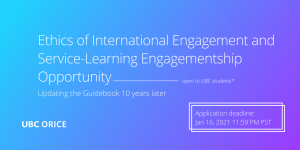Overview:
From the narratives that we tell about ourselves to those that inspire us to change, stories are the heartbeat of solidarity, potential understanding, and, ultimately, action. Beyond the sharing of mere facts, they have the ability to convey and unlock the depths of human experiences and push one to adopt new ways of life. But, in a context of overlapping climate and social crises, what are the intersections between storytelling and advocacy? What did advocacy look like for community leaders during the isolation of the past year? And how does one engage with people that are resistant to change?
Far from showcasing already-made ‘solutions’ or ‘theories’, it is to discuss, engage others in dialog and introduce the complexities of advocacy that the UBC Office of Regional and International Community Engagement (ORICE) seeks to develop a series of podcast episodes on the multiple edges of this topic. This medium will also be an opportunity to further unpack the inputs of, build upon the work of, and give lasting life to the past events organized by ORICE and its current projects intersecting advocacy, such as the Scholars at Risk and Human Rights Collective and the Collective for Gender+ in Research.
We are looking for curious storytellers (and/or participants interested in podcast-making) who have a great sense of initiative and who are passionate about social justice and advocacy. Together, they will form a team that will start, from scratch, the conceptualization and the production of a five-part podcast series podcast, launched later in the academic year.
Scope:
Throughout the year, a team of 2-4 students will spend 3-5 hours each week to conceptualize and produce the podcast series while achieving maximum accessibility to the aimed-at audience. To conduct this work, students will be asked to engage in various activities, including, but not limited to: participating in weekly scheduled calls, receiving the training of podcast-making and interviewing, brainstorming about and articulate its topics, audience, and invited speakers, hold interviews, edit, and produce the podcast. It is because this opportunity requires starting a project from scratch and learning new skills that we expect to spread over the whole academic year.
Deliverables & Milestones:
From mid-September to the end of November, the team will receive training on the production of podcasts and will familiarize itself with the literature surrounding advocacy and its connections with the work of ORICE. They will also conceptualize and plan the production of podcast episodes (which will take place during the second half of the academic year). By the end of the term, students will be asked to provide a production calendar and a short presentation about the series to the team at ORICE.
From January to the last week of March, the team will conduct the research, hold the interviews, and edit the episodes of the podcast. Meeting with the communications assistant at ORICE, they will also think about the distribution strategy of this project. By the end of the term, students will be asked to provide a final report (on their tips and resources for continued podcast-making) and give a short presentation to the team at ORICE about their key learnings.
While the program’s facilitators have drafted the program structure and suggested milestones for the project, students will be given the flexibility to co-design and modify their outcomes as they deem relevant and in coordination with ORICE project leads. The students participating in this engagementship will be supported by ORICE team leads throughout this project.
Academic integration:
Please note this is a not-for-credit unpaid opportunity. If you are interested in making this a student-directed study course, please contact ubc.orice@ubc.ca to discuss the process to explore this option.
Anti-Racism and Ethics of Engagement:
The Office for Regional and International Community Engagement (UBC ORICE) is committed to embedding anti-racism in our daily work and ongoing projects. Students are encouraged and expected to consider how they can take an anti-racist lens to the work they produce around citizen science, data collection and use, and connections between community-based organizations, academics, and government. This might include, but is not limited to, ensuring the incorporation of the ongoing and often unrecognized work of organizations advocating for justice for minorities, particularly during the pandemic; or engaging with the politics of citation in including and citing the work of non-white scholars and other researchers.
Eligibility
- Be an undergraduate or graduate student (domestic or international) at the University of British Columbia with 60 or more completed credits as of May 1st, 2021. (Note: recent grads are welcome to apply but priority will be given to current undergraduate students);
- Have access to a reliable internet connection and computer to collaborate with peers and attend all meetings remotely;
- Demonstrate ability to think critically and creatively;
- Demonstrate ability to take initiative and work in a collaborative environment;
- Prior experience with content production is an asset
- Prior knowledge about or interest in advocacy, social justice, and storytelling is an asset, but not necessary.
Timeline:
Deadline: September 12, 2021 @ Noon 12.00pm PST (updated)
Successful shortlisted candidates contacted by: September 13, 2021
Short interviews on: September 13th week
Project dates: September 20, 2021, to December 7, 2021
How to apply:
Please fill out the application form here, noting the following deadlines and dates for the engagementship.
Deadline: September 12, 2021 @ Noon 12.00pm PST (updated)
Please reach out to us at ubc.orice@ubc.ca if you have any questions.
______________________________________________________
The Office for Regional and International Community Engagement (ORICE) acknowledges that we organize, research, and learn on unceded traditional xʷməθkʷəy̓əm (Musqueam) territory. We understand that both gender and research have been used as tools of colonization on these lands, and commit to working towards disentangling gender+ research from colonialism and Indigenous genocide.

